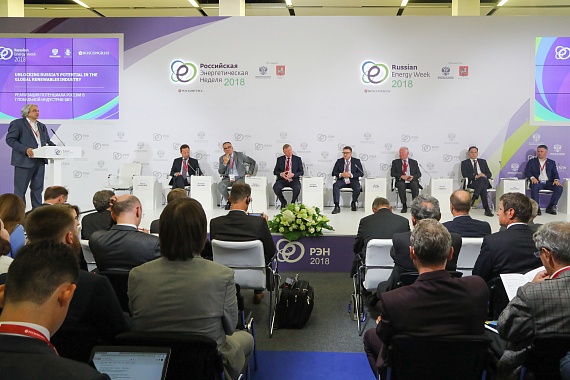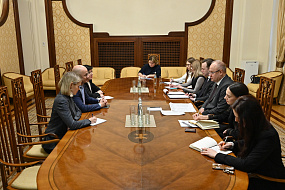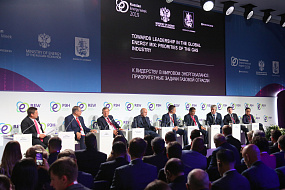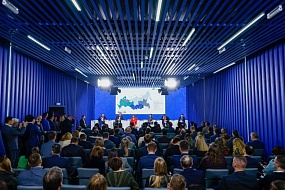Unlocking Russia’s Potential in the Global Renewables Industry

KEY CONCLUSIONS
The importance of renewable energy in Russia is growing
“Thanks to the active joint work of the government and businesses, renewable energy in Russia already is a success as an industry. The volume of generation doubles annually on the wholesale market of electric energy. Over 300 megawatts of renewable energy may be introduced this year. In isolated energy districts, power plants based on renewable energy sources and hybrid power plants are already starting to replace traditional energy sources. The development of regulatory legislation has been completed, which will allow introducing renewable energy sources for ordinary households. The main task for the development of country’s green energy is creating our own technological and production basis, which would be capable of expanding the presence of Russian producers in the global energy markets. We set ambitious tasks and, of course, we will strive to accomplish them,” Alexey Texler, First Deputy Minister of Energy of the Russian Federation.
“It is obvious to everyone that the [RES] industry has been born <...> The president spoke about it among other priorities <...> This is the most important result. It is provided by the colossal work of the Ministry of Energy, the Ministry of Industry, dozens of regulations, the most complex regulatory system that is working,” Anatoliy Chubais, Chairman of the Executive Board, RUSNANO Corporation.
“Energy industry is being transformed <…> towards renewable sources,” Alexander Chuvaev, Executive Vice President, Head of the Russia Division, Fortum Corporation.
“From the standpoint of generation launch, since the end of 2014 renewable energy has been ahead of the traditional ones: coal, gas and other types of generation. <...> This trend continues,” Alexey Texler, First Deputy Minister of Energy of the Russian Federation.
Electricity production with renewable energy sources becomes competitive
“We see how <...> the main indicator, the CapEx (capital expenditure – Ed.) decreases. Last year, 35% decrease for wind power, 30% for solar power; if in 2015 we paid 155 million roubles per one megawatt of wind power, today it’s already 57 million plus something,” Alexey Texler, First Deputy Minister of Energy of the Russian Federation.
“These days in Russia, several major groups, both in Moscow and in St. Petersburg, and in other regions too, are engaged in solar energy <...> transmission of solar energy to Earth, solar generation, etc. We already see the results <...> today,” Alexander Sigov, President, Federal State Budget Educational Institution of Higher Education ‘MIREA - Russian Technological University’.
PROBLEMS
Support measures for renewable energy are limited
“My <...> assessment of the next stage is alarming <...> I am talking about the difficult battle that is now underway called DPM-2 (power supply contracts programme, – Ed.), and the decisions made in this field <...> We have carried out <...> the work for us to understand, how much wind power and renewable energy in Russia we need <...> Is it possible to limit ourselves to those [power supplies], that are going to be introduced in 2024? Definitely not <...> Because <...> we need a balanced, self-reproducible cluster with export potential, which includes generation, industry, science and education <...> If at least one [component] falls, and the most vulnerable one <...> is science, this would mean that there will be no technological cluster in Russia. This means that <...> after 2024, in the event that an adequate decision to develop DPM-2 is not made, all the previously born renewable energy in Russia withers. And that means Russia will simply stop playing the role of the global energy power after 2024,” Anatoliy Chubais, Chairman of the Executive Board, RUSNANO Corporation.
Attracting financing for renewable energy is complicated
“We compete with companies with interest rates of 0.5% to 1%, sometimes they have totally free money <...> From standpoint of support in terms of raising capital, we need it badly,” Igor Shakhray, General Director, Hevel Group.
Market for power supply of isolated territories does not exist
“The projects (for introduction of energy supply systems in isolated territories, – Ed.) remain <...> as single ones <...> carried out by enthusiasts. <...> Therefore, we have a developed wholesale market, but the market of isolated territories is undeveloped. Unfortunately, that is a problem <...> It is not only the matter of economic efficiency, but also, more generally, of energy infrastructure availability for a number of <...> consumers <...> For us, reliability and economic efficiency are not always the same things <...> There should be other incentives < ...> that would allow the public to get access to infrastructure that <...> is going to <...> be based on renewable energy facilities. All countries facing similar challenges have already taken this path,” Aleksey Kaplun, Council Member, EUROSOLAR Russia Non-Profit Partnership for the Development of Renewable Energy.
Energy storage technologies need to be developed in parallel
“Energy storage is becoming more and more important in systems that are not fully balanced by renewables,” Willem Coppoolse, Senior Business Developer for Russia, Engie.
Manufacturers of equipment for the renewable energy sector face a revenue drop
“In two years, the global picture has changed. Turbine prices dropped, while [there were] no technological breakthroughs that would lead to such significant decrease. Revenue from major manufacturers of wind power equipment decreased by 30%, while the volume of orders increased. Today, large energy companies are still major customers in the wind energy projects, but today it is shifting into the segment <...> when <...> companies order wind farms and power supply systems for themselves,” Alexander Korchagin, General Director, NovaWind.
SOLUTIONS
Developing the market for power supply in isolated areas
“There is a national project on isolated territories that the Ministry of Energy adopted in late December last year (project to introduce the energy supply system in remote isolated areas of the Russian Federation – Ed.),” George Kekelidze, Chairman of the Board, EUROSOLAR Russia Association for Renewable Energy; Managing Partner, GO2RU Solution Providing Agency
“The most logical thing is the development of renewable energy generation in the territories with the lack of traditional energy resources. In remote isolated areas there are all the necessary conditions for recoupment of renewable energy projects,” Maksim Bystrov, Chairman of the Board, NP Market Council Association.
Extending the power supply contracts programme for renewable energy
“There is an opinion of <...> many heat <...> generators, consumers who would like to see the power supply contracts programme for renewables transformed. There is an opinion of companies that are actively involved in these projects, that this programme should be continued <...> The programme should stimulate the development of our own domestic competencies,” Alexey Texler, First Deputy Minister of Energy of the Russian Federation.
Stimulating demand for green energy
“We see the future in developing voluntary demand. We have consumers who are willing to pay more for green electrons <...> We <...> are looking at the western experience, and we will probably develop <...> a mechanism that would allow to satisfy this voluntary demand,” Maksim Bystrov, Chairman of the Board, NP Market Council Association.
Developing international cooperation
“Even in times of political turmoil, business cooperation between our countries needs to be stimulated,” Charles Hendry, Director, Head of Future Energy, London Power Corporation; Minister of State for Energy (Department for Energy & Climate Change) of the United Kingdom of Great Britain and Northern Ireland (2010–2012).
“Let’s work together; that would allow us to succeed,” Andreas Dreisiebner, Member of the Management Board, Solarspar Association.
“We are looking for partners <...> in Russia <...> We need to work closely with your economy,” Herve Amosse, Executive Vice President for Transportation, Telecom and Grid, Saft Groupe, Total Groupe
Combining renewable energy and traditional sources of electricity
“The future is a combination of both renewable energy sources and traditional sources for national electricity production,” Charles Hendry, Director, Head of Future Energy, London Power Corporation; Minister of State for Energy (Department for Energy & Climate Change) of the United Kingdom of Great Britain and Northern Ireland (2010–2012).
Increasing competitiveness of power from renewable energy sources
“We have a very austere cost reduction programme <...> we monitor every rouble <...> in order to transform our costs,” Igor Shakhray, General Director, Hevel Group.
Credit rate subsidies
“We need to work on rate subsidies. That is also the right possible solution to the problem, because that too increases the cost of our projects; and it is not a matter of regulation of the power supply contracts programme for renewables, it is a problem of a larger scale,” Alexey Texler, First Deputy Minister of Energy of the Russian Federation.
Providing export opportunities
“In order for the power supplies to work, no matter what kind of support programme outside of 2024 is in place, one of the important areas of work is to ensure <...> export opportunities to make these plants work,” Alexander Gareev, Managing Director, Eurasian Development Bank (EDB).





